Reflective Writing Report: Management Assessment 4 Analysis and Review
VerifiedAdded on 2021/05/31
|7
|1524
|327
Report
AI Summary
This report is a reflective analysis of a management assessment, focusing on the application of the Competing Values Framework (CVF) to understand and improve leadership skills within the tourism and hospitality sectors. The student utilizes the CVF to evaluate their own leadership roles, identifying strengths and areas for development. The analysis includes two CVF 'spiderweb' profiles, comparing changes in roles such as innovator, broker, and director. The report discusses the importance of flexibility, motivation, and communication in management, and how these factors contribute to organizational success. The author explores the need for managers to adapt to external environmental changes, build customer relationships, and foster employee motivation. The report references various academic sources and blogs to support its findings and concludes with recommendations for enhancing managerial effectiveness and organizational flexibility.
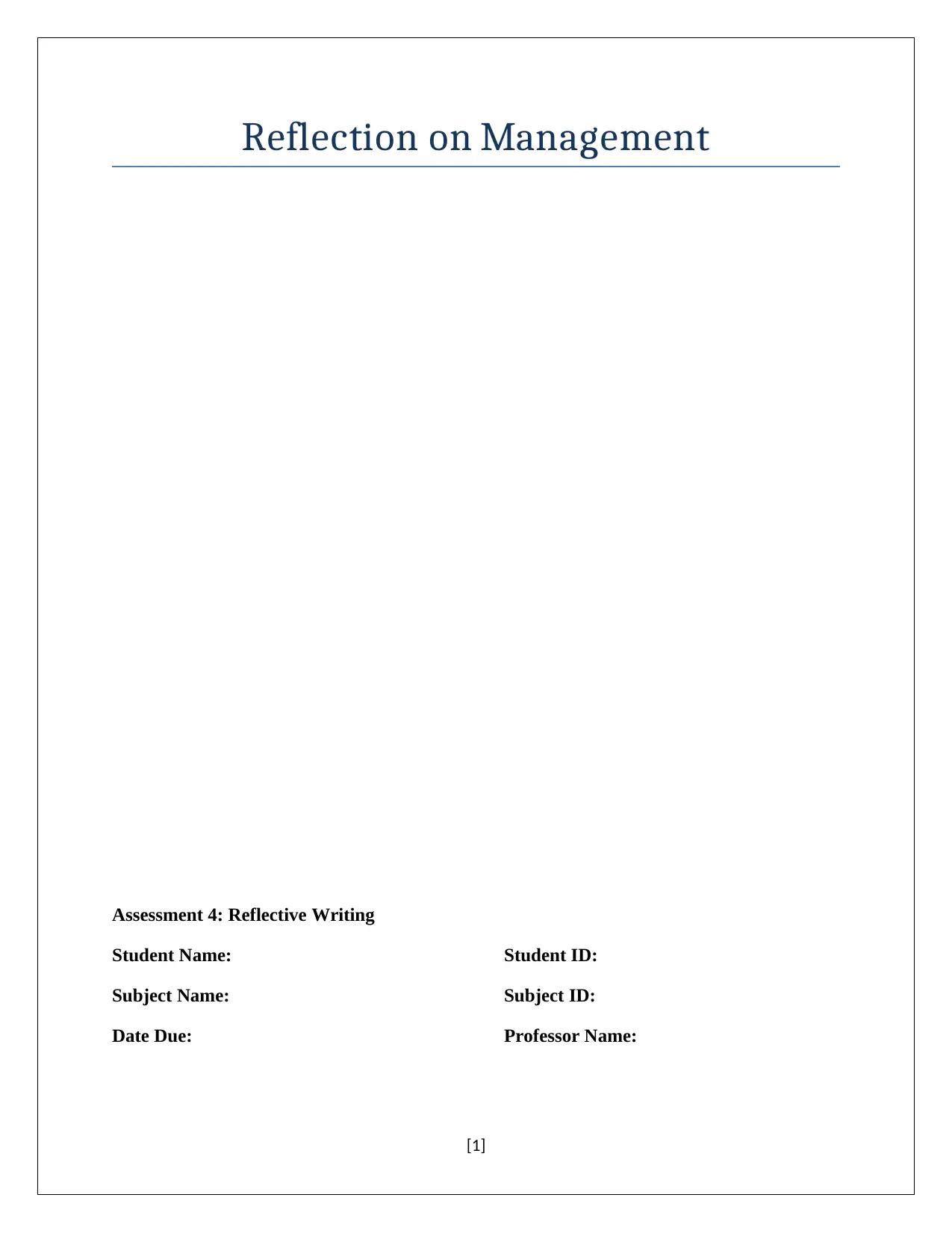
Reflection on Management
Assessment 4: Reflective Writing
Student Name: Student ID:
Subject Name: Subject ID:
Date Due: Professor Name:
[1]
Assessment 4: Reflective Writing
Student Name: Student ID:
Subject Name: Subject ID:
Date Due: Professor Name:
[1]
Paraphrase This Document
Need a fresh take? Get an instant paraphrase of this document with our AI Paraphraser
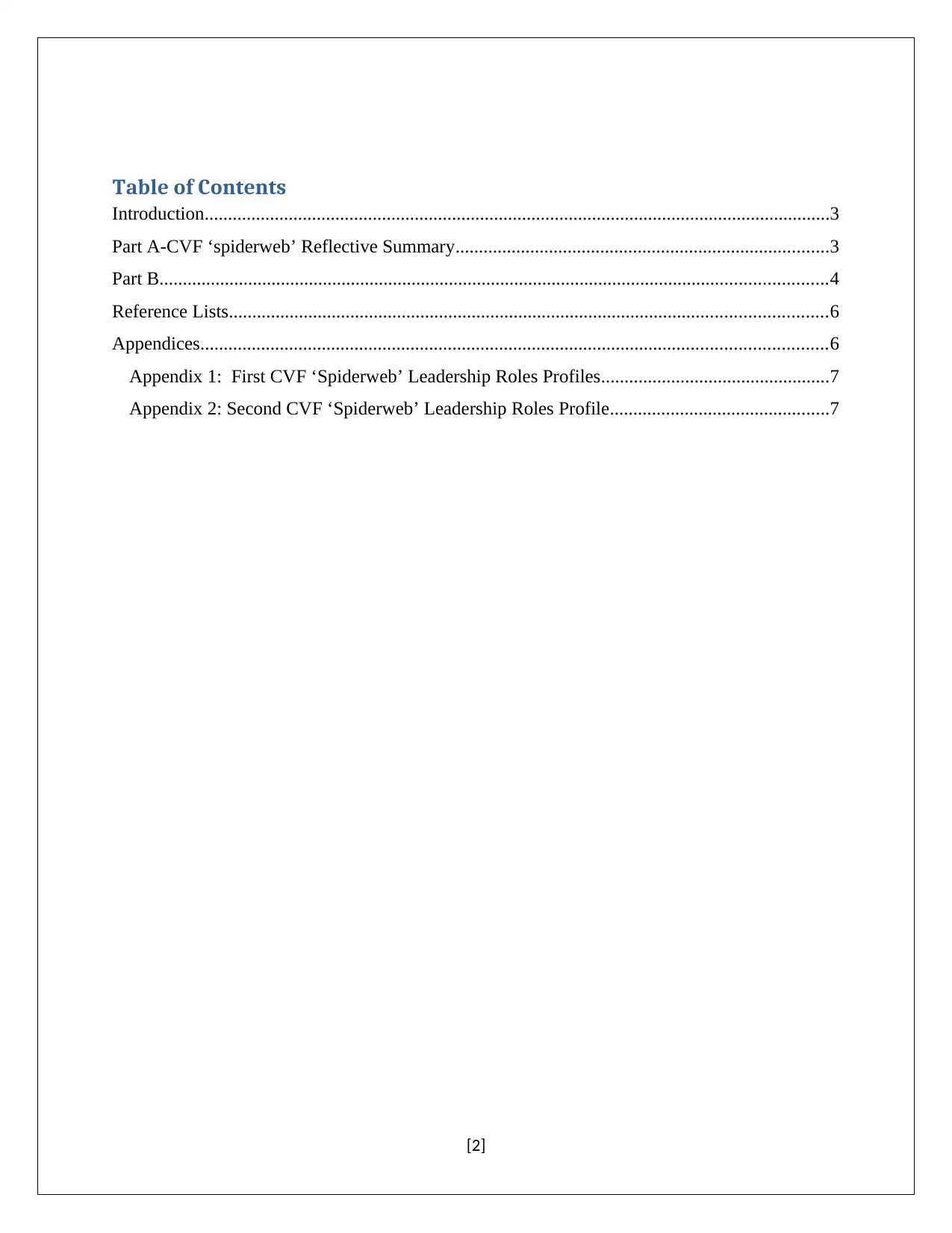
Table of Contents
Introduction......................................................................................................................................3
Part A-CVF ‘spiderweb’ Reflective Summary................................................................................3
Part B...............................................................................................................................................4
Reference Lists................................................................................................................................6
Appendices......................................................................................................................................6
Appendix 1: First CVF ‘Spiderweb’ Leadership Roles Profiles.................................................7
Appendix 2: Second CVF ‘Spiderweb’ Leadership Roles Profile...............................................7
[2]
Introduction......................................................................................................................................3
Part A-CVF ‘spiderweb’ Reflective Summary................................................................................3
Part B...............................................................................................................................................4
Reference Lists................................................................................................................................6
Appendices......................................................................................................................................6
Appendix 1: First CVF ‘Spiderweb’ Leadership Roles Profiles.................................................7
Appendix 2: Second CVF ‘Spiderweb’ Leadership Roles Profile...............................................7
[2]
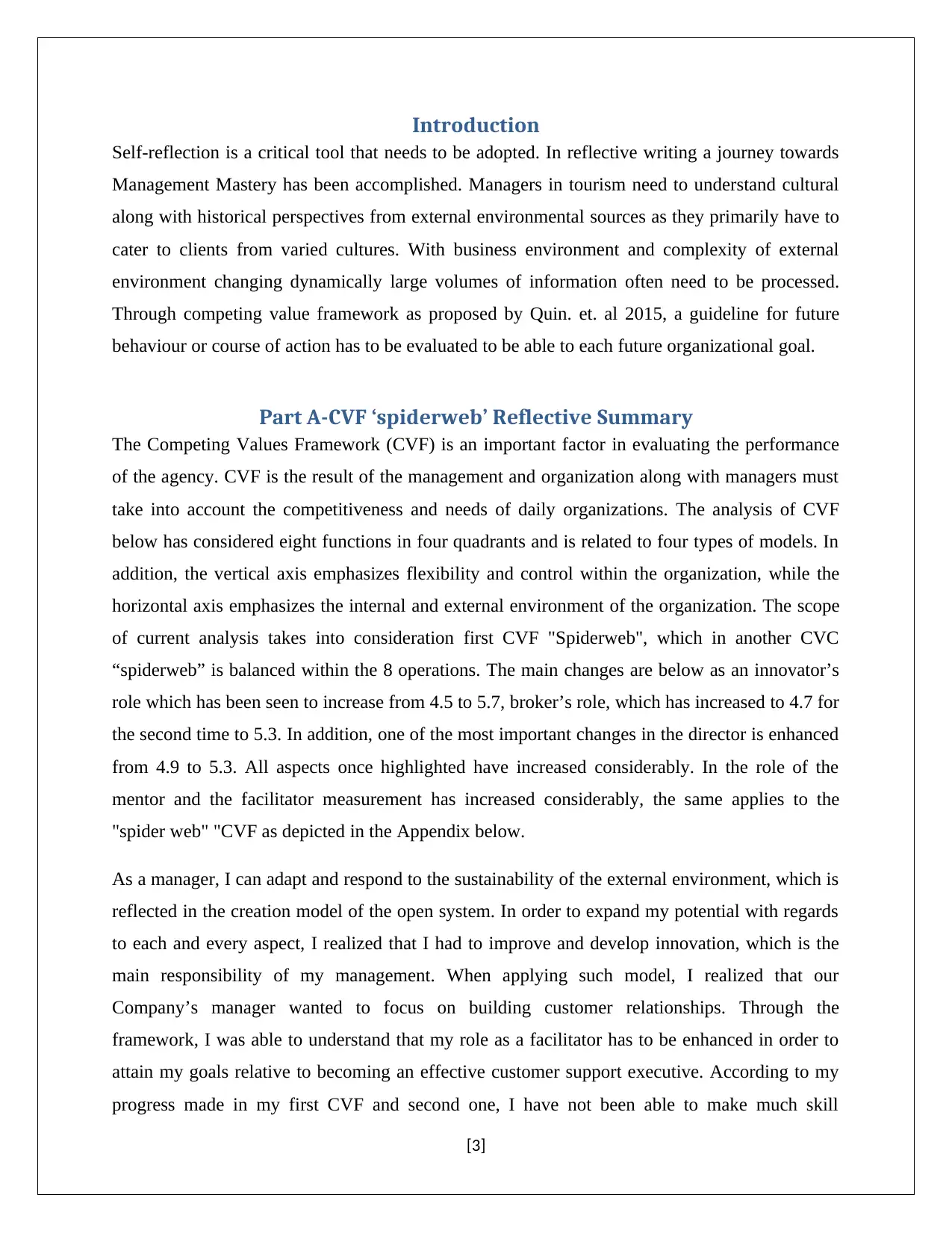
Introduction
Self-reflection is a critical tool that needs to be adopted. In reflective writing a journey towards
Management Mastery has been accomplished. Managers in tourism need to understand cultural
along with historical perspectives from external environmental sources as they primarily have to
cater to clients from varied cultures. With business environment and complexity of external
environment changing dynamically large volumes of information often need to be processed.
Through competing value framework as proposed by Quin. et. al 2015, a guideline for future
behaviour or course of action has to be evaluated to be able to each future organizational goal.
Part A-CVF ‘spiderweb’ Reflective Summary
The Competing Values Framework (CVF) is an important factor in evaluating the performance
of the agency. CVF is the result of the management and organization along with managers must
take into account the competitiveness and needs of daily organizations. The analysis of CVF
below has considered eight functions in four quadrants and is related to four types of models. In
addition, the vertical axis emphasizes flexibility and control within the organization, while the
horizontal axis emphasizes the internal and external environment of the organization. The scope
of current analysis takes into consideration first CVF "Spiderweb", which in another CVC
“spiderweb” is balanced within the 8 operations. The main changes are below as an innovator’s
role which has been seen to increase from 4.5 to 5.7, broker’s role, which has increased to 4.7 for
the second time to 5.3. In addition, one of the most important changes in the director is enhanced
from 4.9 to 5.3. All aspects once highlighted have increased considerably. In the role of the
mentor and the facilitator measurement has increased considerably, the same applies to the
"spider web" "CVF as depicted in the Appendix below.
As a manager, I can adapt and respond to the sustainability of the external environment, which is
reflected in the creation model of the open system. In order to expand my potential with regards
to each and every aspect, I realized that I had to improve and develop innovation, which is the
main responsibility of my management. When applying such model, I realized that our
Company’s manager wanted to focus on building customer relationships. Through the
framework, I was able to understand that my role as a facilitator has to be enhanced in order to
attain my goals relative to becoming an effective customer support executive. According to my
progress made in my first CVF and second one, I have not been able to make much skill
[3]
Self-reflection is a critical tool that needs to be adopted. In reflective writing a journey towards
Management Mastery has been accomplished. Managers in tourism need to understand cultural
along with historical perspectives from external environmental sources as they primarily have to
cater to clients from varied cultures. With business environment and complexity of external
environment changing dynamically large volumes of information often need to be processed.
Through competing value framework as proposed by Quin. et. al 2015, a guideline for future
behaviour or course of action has to be evaluated to be able to each future organizational goal.
Part A-CVF ‘spiderweb’ Reflective Summary
The Competing Values Framework (CVF) is an important factor in evaluating the performance
of the agency. CVF is the result of the management and organization along with managers must
take into account the competitiveness and needs of daily organizations. The analysis of CVF
below has considered eight functions in four quadrants and is related to four types of models. In
addition, the vertical axis emphasizes flexibility and control within the organization, while the
horizontal axis emphasizes the internal and external environment of the organization. The scope
of current analysis takes into consideration first CVF "Spiderweb", which in another CVC
“spiderweb” is balanced within the 8 operations. The main changes are below as an innovator’s
role which has been seen to increase from 4.5 to 5.7, broker’s role, which has increased to 4.7 for
the second time to 5.3. In addition, one of the most important changes in the director is enhanced
from 4.9 to 5.3. All aspects once highlighted have increased considerably. In the role of the
mentor and the facilitator measurement has increased considerably, the same applies to the
"spider web" "CVF as depicted in the Appendix below.
As a manager, I can adapt and respond to the sustainability of the external environment, which is
reflected in the creation model of the open system. In order to expand my potential with regards
to each and every aspect, I realized that I had to improve and develop innovation, which is the
main responsibility of my management. When applying such model, I realized that our
Company’s manager wanted to focus on building customer relationships. Through the
framework, I was able to understand that my role as a facilitator has to be enhanced in order to
attain my goals relative to becoming an effective customer support executive. According to my
progress made in my first CVF and second one, I have not been able to make much skill
[3]
⊘ This is a preview!⊘
Do you want full access?
Subscribe today to unlock all pages.

Trusted by 1+ million students worldwide
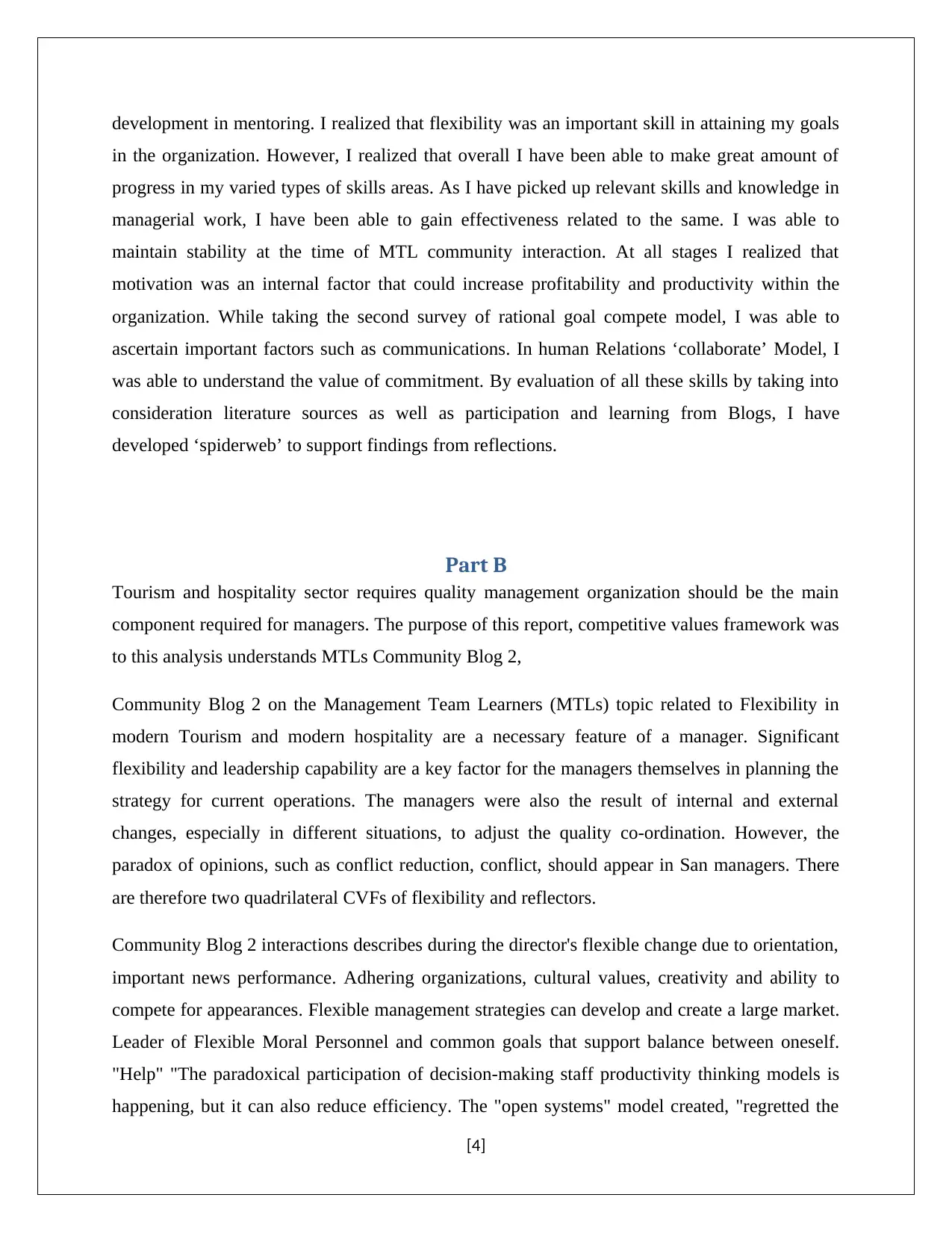
development in mentoring. I realized that flexibility was an important skill in attaining my goals
in the organization. However, I realized that overall I have been able to make great amount of
progress in my varied types of skills areas. As I have picked up relevant skills and knowledge in
managerial work, I have been able to gain effectiveness related to the same. I was able to
maintain stability at the time of MTL community interaction. At all stages I realized that
motivation was an internal factor that could increase profitability and productivity within the
organization. While taking the second survey of rational goal compete model, I was able to
ascertain important factors such as communications. In human Relations ‘collaborate’ Model, I
was able to understand the value of commitment. By evaluation of all these skills by taking into
consideration literature sources as well as participation and learning from Blogs, I have
developed ‘spiderweb’ to support findings from reflections.
Part B
Tourism and hospitality sector requires quality management organization should be the main
component required for managers. The purpose of this report, competitive values framework was
to this analysis understands MTLs Community Blog 2,
Community Blog 2 on the Management Team Learners (MTLs) topic related to Flexibility in
modern Tourism and modern hospitality are a necessary feature of a manager. Significant
flexibility and leadership capability are a key factor for the managers themselves in planning the
strategy for current operations. The managers were also the result of internal and external
changes, especially in different situations, to adjust the quality co-ordination. However, the
paradox of opinions, such as conflict reduction, conflict, should appear in San managers. There
are therefore two quadrilateral CVFs of flexibility and reflectors.
Community Blog 2 interactions describes during the director's flexible change due to orientation,
important news performance. Adhering organizations, cultural values, creativity and ability to
compete for appearances. Flexible management strategies can develop and create a large market.
Leader of Flexible Moral Personnel and common goals that support balance between oneself.
"Help" "The paradoxical participation of decision-making staff productivity thinking models is
happening, but it can also reduce efficiency. The "open systems" model created, "regretted the
[4]
in the organization. However, I realized that overall I have been able to make great amount of
progress in my varied types of skills areas. As I have picked up relevant skills and knowledge in
managerial work, I have been able to gain effectiveness related to the same. I was able to
maintain stability at the time of MTL community interaction. At all stages I realized that
motivation was an internal factor that could increase profitability and productivity within the
organization. While taking the second survey of rational goal compete model, I was able to
ascertain important factors such as communications. In human Relations ‘collaborate’ Model, I
was able to understand the value of commitment. By evaluation of all these skills by taking into
consideration literature sources as well as participation and learning from Blogs, I have
developed ‘spiderweb’ to support findings from reflections.
Part B
Tourism and hospitality sector requires quality management organization should be the main
component required for managers. The purpose of this report, competitive values framework was
to this analysis understands MTLs Community Blog 2,
Community Blog 2 on the Management Team Learners (MTLs) topic related to Flexibility in
modern Tourism and modern hospitality are a necessary feature of a manager. Significant
flexibility and leadership capability are a key factor for the managers themselves in planning the
strategy for current operations. The managers were also the result of internal and external
changes, especially in different situations, to adjust the quality co-ordination. However, the
paradox of opinions, such as conflict reduction, conflict, should appear in San managers. There
are therefore two quadrilateral CVFs of flexibility and reflectors.
Community Blog 2 interactions describes during the director's flexible change due to orientation,
important news performance. Adhering organizations, cultural values, creativity and ability to
compete for appearances. Flexible management strategies can develop and create a large market.
Leader of Flexible Moral Personnel and common goals that support balance between oneself.
"Help" "The paradoxical participation of decision-making staff productivity thinking models is
happening, but it can also reduce efficiency. The "open systems" model created, "regretted the
[4]
Paraphrase This Document
Need a fresh take? Get an instant paraphrase of this document with our AI Paraphraser
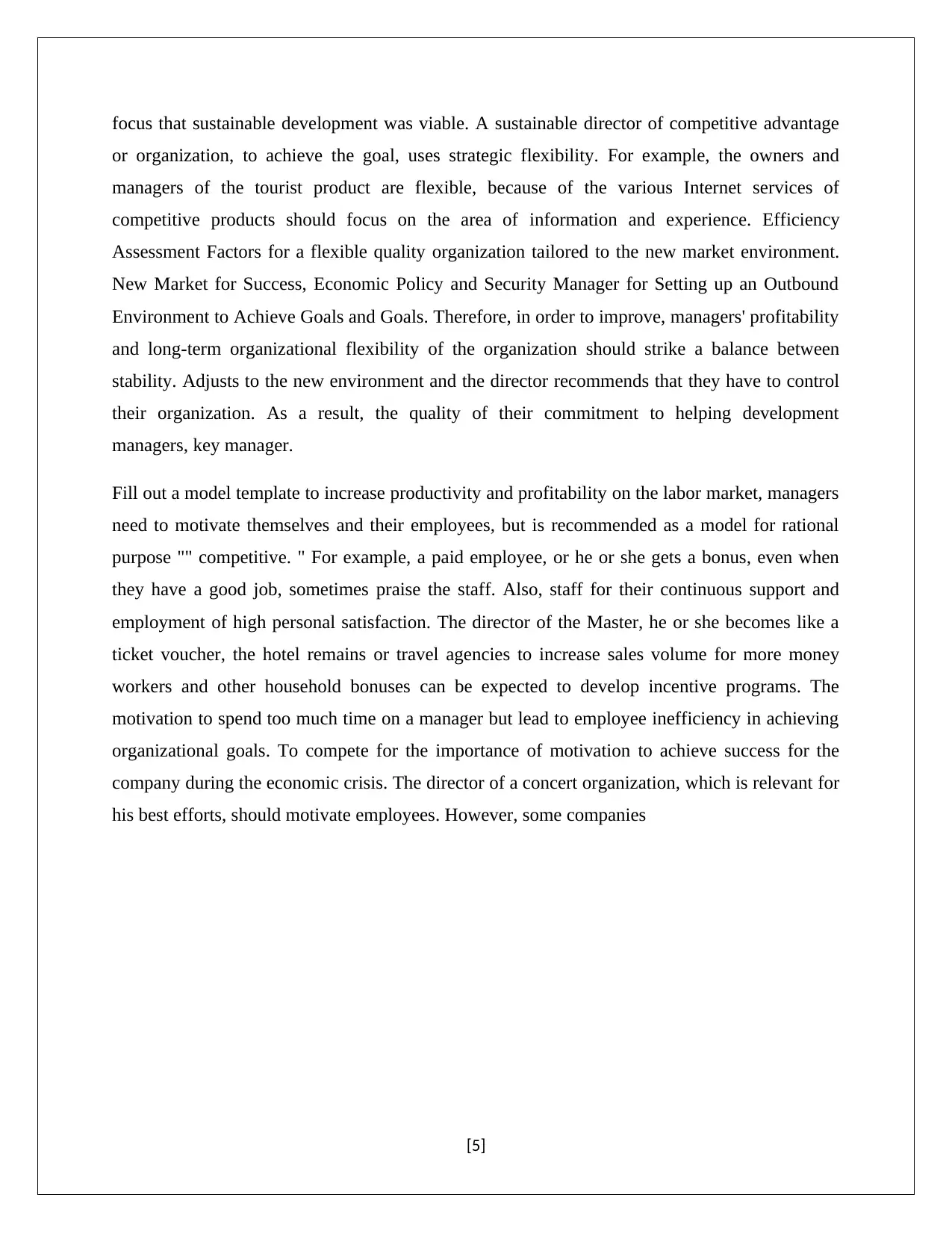
focus that sustainable development was viable. A sustainable director of competitive advantage
or organization, to achieve the goal, uses strategic flexibility. For example, the owners and
managers of the tourist product are flexible, because of the various Internet services of
competitive products should focus on the area of information and experience. Efficiency
Assessment Factors for a flexible quality organization tailored to the new market environment.
New Market for Success, Economic Policy and Security Manager for Setting up an Outbound
Environment to Achieve Goals and Goals. Therefore, in order to improve, managers' profitability
and long-term organizational flexibility of the organization should strike a balance between
stability. Adjusts to the new environment and the director recommends that they have to control
their organization. As a result, the quality of their commitment to helping development
managers, key manager.
Fill out a model template to increase productivity and profitability on the labor market, managers
need to motivate themselves and their employees, but is recommended as a model for rational
purpose "" competitive. " For example, a paid employee, or he or she gets a bonus, even when
they have a good job, sometimes praise the staff. Also, staff for their continuous support and
employment of high personal satisfaction. The director of the Master, he or she becomes like a
ticket voucher, the hotel remains or travel agencies to increase sales volume for more money
workers and other household bonuses can be expected to develop incentive programs. The
motivation to spend too much time on a manager but lead to employee inefficiency in achieving
organizational goals. To compete for the importance of motivation to achieve success for the
company during the economic crisis. The director of a concert organization, which is relevant for
his best efforts, should motivate employees. However, some companies
[5]
or organization, to achieve the goal, uses strategic flexibility. For example, the owners and
managers of the tourist product are flexible, because of the various Internet services of
competitive products should focus on the area of information and experience. Efficiency
Assessment Factors for a flexible quality organization tailored to the new market environment.
New Market for Success, Economic Policy and Security Manager for Setting up an Outbound
Environment to Achieve Goals and Goals. Therefore, in order to improve, managers' profitability
and long-term organizational flexibility of the organization should strike a balance between
stability. Adjusts to the new environment and the director recommends that they have to control
their organization. As a result, the quality of their commitment to helping development
managers, key manager.
Fill out a model template to increase productivity and profitability on the labor market, managers
need to motivate themselves and their employees, but is recommended as a model for rational
purpose "" competitive. " For example, a paid employee, or he or she gets a bonus, even when
they have a good job, sometimes praise the staff. Also, staff for their continuous support and
employment of high personal satisfaction. The director of the Master, he or she becomes like a
ticket voucher, the hotel remains or travel agencies to increase sales volume for more money
workers and other household bonuses can be expected to develop incentive programs. The
motivation to spend too much time on a manager but lead to employee inefficiency in achieving
organizational goals. To compete for the importance of motivation to achieve success for the
company during the economic crisis. The director of a concert organization, which is relevant for
his best efforts, should motivate employees. However, some companies
[5]
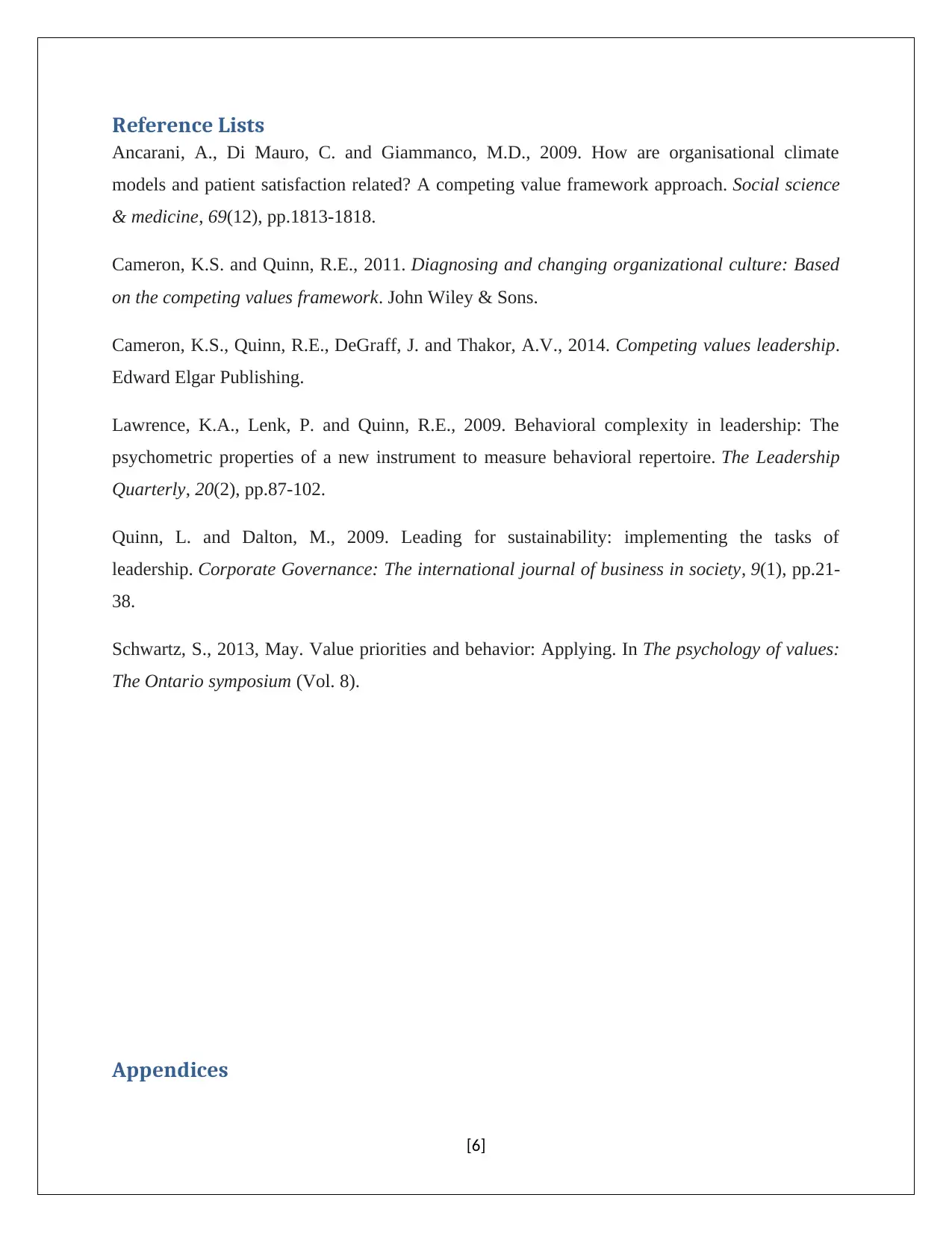
Reference Lists
Ancarani, A., Di Mauro, C. and Giammanco, M.D., 2009. How are organisational climate
models and patient satisfaction related? A competing value framework approach. Social science
& medicine, 69(12), pp.1813-1818.
Cameron, K.S. and Quinn, R.E., 2011. Diagnosing and changing organizational culture: Based
on the competing values framework. John Wiley & Sons.
Cameron, K.S., Quinn, R.E., DeGraff, J. and Thakor, A.V., 2014. Competing values leadership.
Edward Elgar Publishing.
Lawrence, K.A., Lenk, P. and Quinn, R.E., 2009. Behavioral complexity in leadership: The
psychometric properties of a new instrument to measure behavioral repertoire. The Leadership
Quarterly, 20(2), pp.87-102.
Quinn, L. and Dalton, M., 2009. Leading for sustainability: implementing the tasks of
leadership. Corporate Governance: The international journal of business in society, 9(1), pp.21-
38.
Schwartz, S., 2013, May. Value priorities and behavior: Applying. In The psychology of values:
The Ontario symposium (Vol. 8).
Appendices
[6]
Ancarani, A., Di Mauro, C. and Giammanco, M.D., 2009. How are organisational climate
models and patient satisfaction related? A competing value framework approach. Social science
& medicine, 69(12), pp.1813-1818.
Cameron, K.S. and Quinn, R.E., 2011. Diagnosing and changing organizational culture: Based
on the competing values framework. John Wiley & Sons.
Cameron, K.S., Quinn, R.E., DeGraff, J. and Thakor, A.V., 2014. Competing values leadership.
Edward Elgar Publishing.
Lawrence, K.A., Lenk, P. and Quinn, R.E., 2009. Behavioral complexity in leadership: The
psychometric properties of a new instrument to measure behavioral repertoire. The Leadership
Quarterly, 20(2), pp.87-102.
Quinn, L. and Dalton, M., 2009. Leading for sustainability: implementing the tasks of
leadership. Corporate Governance: The international journal of business in society, 9(1), pp.21-
38.
Schwartz, S., 2013, May. Value priorities and behavior: Applying. In The psychology of values:
The Ontario symposium (Vol. 8).
Appendices
[6]
⊘ This is a preview!⊘
Do you want full access?
Subscribe today to unlock all pages.

Trusted by 1+ million students worldwide
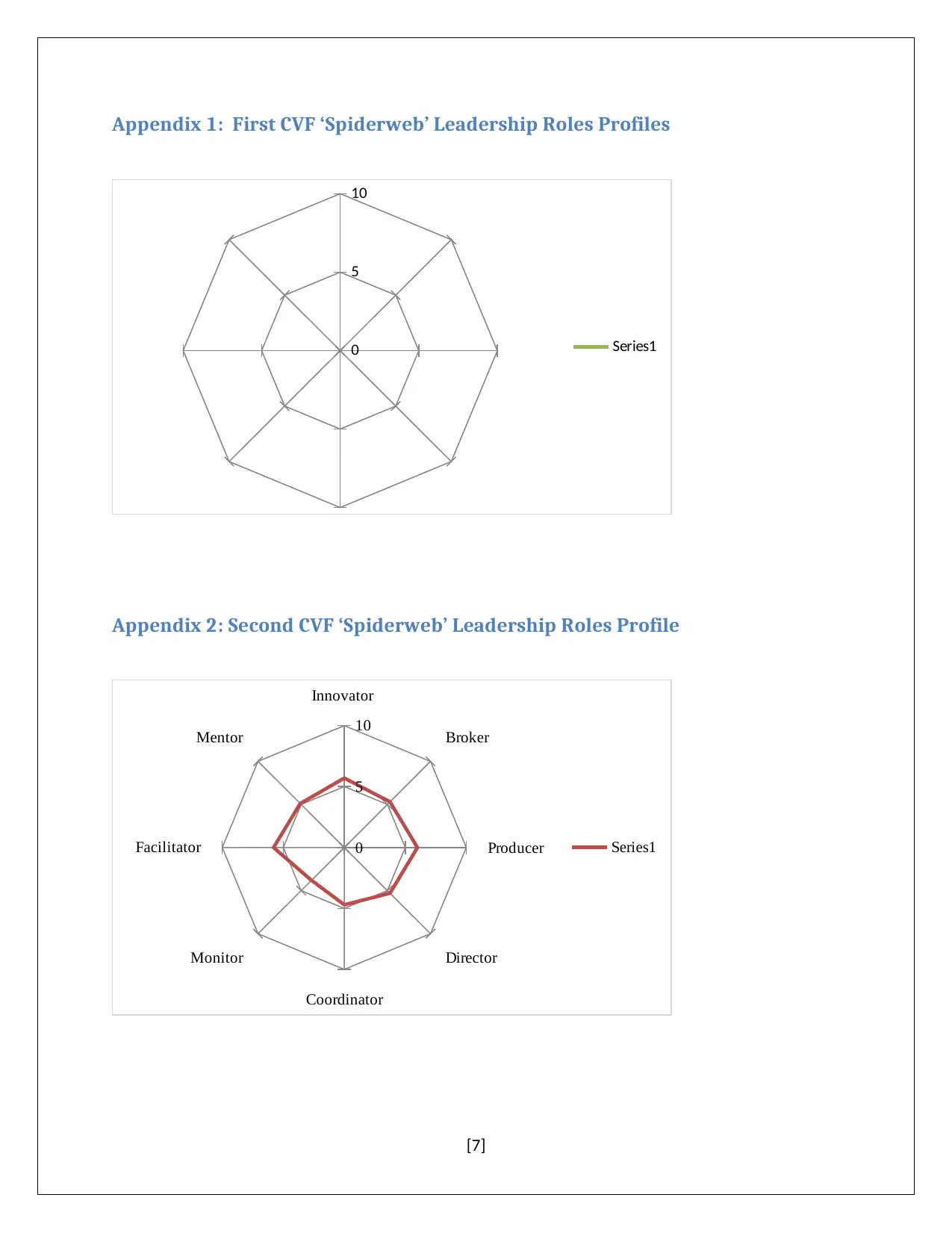
Appendix 1: First CVF ‘Spiderweb’ Leadership Roles Profiles
0
5
10
Series1
Appendix 2: Second CVF ‘Spiderweb’ Leadership Roles Profile
Innovator
Broker
Producer
Director
Coordinator
Monitor
Facilitator
Mentor
0
5
10
Series1
[7]
0
5
10
Series1
Appendix 2: Second CVF ‘Spiderweb’ Leadership Roles Profile
Innovator
Broker
Producer
Director
Coordinator
Monitor
Facilitator
Mentor
0
5
10
Series1
[7]
1 out of 7
Related Documents
Your All-in-One AI-Powered Toolkit for Academic Success.
+13062052269
info@desklib.com
Available 24*7 on WhatsApp / Email
![[object Object]](/_next/static/media/star-bottom.7253800d.svg)
Unlock your academic potential
Copyright © 2020–2026 A2Z Services. All Rights Reserved. Developed and managed by ZUCOL.





